 |
| Clément Cogitore's Braguino and Les Indes galantes (The Amorous Indies) are Best Short Film nominees for the 44th César Awards Photo: Anne-Katrin Titze |
Clément Cogitore's haunting début feature Neither Heaven, Nor Earth (Ni Le Ciel Ni La Terre), shot by Sylvain Verdet, written in collaboration with Les Cowboys director Thomas Bidegain, starred Jean-Pierre Dardenne and Luc Dardenne discovery Jérémie Renier with Kévin Azaïs, Swann Arlaud, and Finnegan Oldfield. The film received a César Award nomination in 2016 and won the Gan Foundation Support for Distribution at the Cannes Film Festival in 2015.
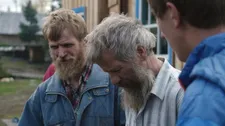 |
| Clément Cogitore on Braguino: "The producer, Cédric Bonin, just took the risk with me. 'Let's try, let's go there!'" |
This year Clément has two César nominations in the Best Short Film category. Les Indes galantes (The Amorous Indies) combining K.R.U.M.P. dance with 18th century composer Jean-Philippe Rameau at the Opéra National de Paris. The five minute short will be screened on the opening night of New York's Rendez-Vous with French Cinema, preceding Pierre Salvadori's The Trouble With You.
The other nomination is for Braguino, a film and a tale of a dream told by firelight. It is a blazing reminder of the highest order of what is at stake for civilisation everywhere. Braguino Ou La Communauté Impossible, an installation of videos and photographs at Le Bal in Paris, curated by Diane Dufour and Léa Bismuth, was on display from September 15 through December 24 in 2017.
With indelible images born from an unflinching gaze, Clément Cogitore's Braguino lets us feel enraptured in an impossible community - cradled by archaic myth and awed by a sublime nature. And slowly, as in a nightmare, we get to understand that this is the story of humankind. A blond child is crying. A duck may not be a duck. The insatiable guns as a parable of our own downfall. Along the Riverrun. The imagined perfection of a past that never existed in the first place.
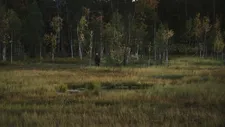 |
| Clément Cogitore: "In the taiga the bear is the biggest danger." |
This is the remote taiga of Eastern Siberia. Two families, the Braguines and the Kilines - the wives are sisters. The Braguines came there first in search of another way of life. One governed by autarky, balance with nature, and dignity. Not poverty and crime and rapacity. The Kilines invite poachers to come in helicopters with their weapons and the foul language of the hateful. They turn their world upside down.
Every day the children from both families are deposited on an island in the river, where the bears can't reach them. There they play. There are dogs. The girls in shiny princess gowns, the boys go with what is practical and functional. Little Vassilissa wears the feet of the dead bear as if they were shoes, found in a fairy tale, contrasting her pale pink frock. It is a harsh life with hungry bears and far more dangerous, man-made perils waiting to ambush.
Anne-Katrin Titze: Braguino started as an exhibition?
Clément Cogitore: The first idea I had was to make an exhibition because half of my work is as a visual artist. At first I didn't have a good entry to create a narrative of the setting because we had only a very short time for shooting.
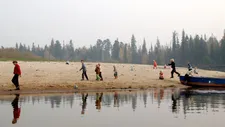 |
| Clément Cogitore: "On the children island there are some dogs around and it's the only place where the bears cannot just come and eat the children." |
I was not sure if I could bring back a narrative, a story enough to edit a film. But I was hoping to maybe do it in two parts, an exhibition and a film. And that is what happened. We realized that there was enough event to tell the story I wanted to tell and also the story that happened during the time we were there.
AKT: When did you film there in Siberia?
CC: In September 2016 and the show in Paris opened in September 2017 and then one month later the film was released in theatres in France and now [spring 2018] the exhibition is in Italy. It's a whole installation of videos and photographs.
AKT: And what you brought for me is the catalogue?
CC: This is the catalogue, the artist book.
AKT: Seeing the film and not the exhibition - the narrative is very strong.
CC: The exhibition is quite narrative, too. But it is less narrative than the film. I also think the film has some experiment moments that are not totally narrative, like experimental narratives. So I think the exhibition is more an experience with narrative elements and the film is more narrative with visual experiments.
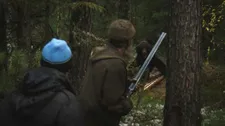 |
| Clément Cogitore on Sacha Braguine and the bear: "I was obviously terrified." |
AKT: How did you first get to know the family?
CC: I was aiming to make a project about autarky, utopia, and children.
AKT: Autarky, utopia and children?
CC: And from the point of view of children. To render how do you create worlds outside of the worlds in remote places or outside civilization. As a child I used to grow up in the forest, which had nothing to do with Siberian forests, not that removed, just the French forest. I just wondered personally to question memory sensations.
AKT: Of playing in the forest?
CC: Of playing in the forest. That was the beginning and then I was just looking for a place all around the world where I could find this kind of situation. I was doing research and all the information I had was this man, Braguine, and the places of Siberia and a journalist friend of mine [Alla Shevelkina] who went with me on the shoot, like a translator. And she had this info that there is one place really really far.
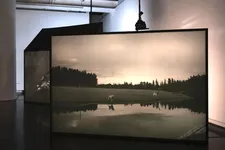 |
| Dogs - Braguino Ou La Communauté Impossible at Le Bal in Paris |
AKT: In Eastern Siberia?
CC: In Eastern Siberia, like in the gulag Siberia, the place where you don't want to be normally. He [Sacha Braguine] went there in 1975 and created like his own little civilisation. And then he had children and she [Alla] knew there were two generations already but she only knew about one family. That was in 2012. So we made the trip, we just had the GPS coordinate and the name. And the producer, Cédric Bonin, just took the risk with me. "Let's try, let's go there!"
We didn't know if they were still there and okay to meet me and to make something about it, a project. At that moment I was resident in the French Academy in Rome. So from Rome I travelled for almost five days without almost any stop.
From Moscow it was two planes and then travelling on a boat on the river, the Yenisei river, and then one day of travelling in the forest and then the last 1,000 kilometers were in a helicopter. So at the end the helicopter lands, I jump out and just say hello.
AKT: And then they opened up to you?
CC: Actually, at the very moment that they understood we didn't have any guns, that we are not here for getting the land or the petrol or to hunt illegally. I said "I heard about you. I just want to meet you to discover what you make here and to maybe tell your story, if you agree with that." Immediately we were accepted like family at the table. Immediately.
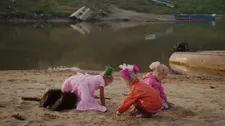 |
| Bear claw and princess dresses in Braguino |
AKT: You seem so close, you show every detail of their life. The food at the table, the hunting, you are so much there.
CC: This is because they are so far from everything. The children when first meeting them - because I made two trips, one for meeting them and one for shooting four years later - and during the first trip, the children I had in front of me just outside the helicopter never saw a human being except the inhabitants of the place. It was like really strange for them and for me.
They are so far from civilization that they don't have any interest for a camera, for a little image. When you are filmmaking a documentary, you normally have to waste time until the people you are filming leave the control.
AKT: And don't try to control the camera?
CC: Yes, and usually it's very hard and takes weeks and weeks.
AKT: And with them it took no time at all?
CC: It was immediately. The camera held no interest for them at all. They were just happy they had somebody there who was not an enemy and wants to tell their story.
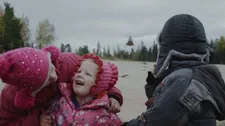 |
| Clément Cogitore: "The helicopter arrived like two days before the end, when we had to go back." |
He [Sacha Braguine] knows the value of what he did and he is quite proud of it and he knows and I know that it's going to disappear really quickly. For him it was a way to have a testimony.
AKT: Of his life's work.
CC: Of his life's work.
AKT: And the creation of this community. The other family we see - the Kilines - there's a very interesting movement how we are introduced to them, how you show that. They are the Other. The Other in the way in Swiss mountain villages, the closest village is the greatest enemy.
The neighbours are the most alien, the most Other. And this is how they talk in the beginning among the family in Braguino. "Don't mention them! They are afraid of little bear cubs! They poison dogs!" In a way, in the beginning we don't believe any of this. As an audience you have your doubts.
CC: Yes, of course it's full of paranoia. I'm used to filming small communities, that could be like remote in apartments or like in fictional documentaries that people are disconnected from the rest of the world and they know that paranoia is a big part of that. And I knew that with the Braguines it was part of their life. When you have an enemy you are projecting so many fears and things that the enemy is not in charge of.
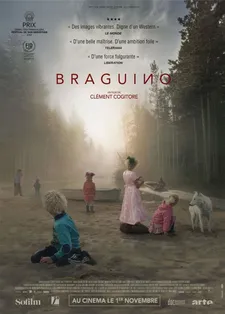 |
| Braguino French film poster |
The Kilines are exactly the same, they are not really bad people, just with different ideology. I knew there was a big part of paranoia but little by little I understood that it was more tragic than that. And that there was a real ideological conflict between the two families.
And that this conflict is like a death sentence for this place and these people. And that what I thought was paranoia, in reality was real. I was filming it as a tragedy because we have small characters facing a danger too big for them and too cruel, too strong.
AKT: That is exactly the narrative, this fantastic narrative, I was talking about. That for the longest time, actually until another helicopter arrives, it stays in the paranoia realm. And then it switches to something totally different and much more important.
CC: That was it exactly for me during the shooting. The helicopter arrived like two days before the end, when we had to go back. Just in the last 38 hours I remembered all I filmed and said, okay, the story will be just the possibility of destruction of everything that we saw before. And that was the tragedy.
AKT: It's funny, though, you and helicopters at the end of your films. There is the helicopter in Neither Heaven, Nor Earth.
CC: In all the projects I make - it's like so cinematographic. It's a way to interact with landscapes that is totally different. There's no path, there's no road, it's just like the world and travelling. That's what I love in a helicopter - movement and travelling.
AKT: And the helicopter arrives out of nowhere, it's the Deus ex machina idea. I remember the last time when we talked about Neither Heaven nor Earth, I brought up the ending of Jacques Demy's Peau D'Âne, where there is an anachronistic helicopter that changes our perception. For the family in your film, tale telling is also of importance. The women tell the tale of the fox and the rabbit.
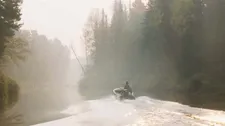 |
| Clément Cogitore on getting to Braguino: "From Moscow it was two planes and then traveling on a boat on the river, the Yenisei river …" |
CC: What interests me in tales, in fairy tales, in a way it's a story for children but they are always very cruel. The stories are: where do we co-habitat with monsters? And in a way in Braguino from the beginning you think that the monster is the bear. Everybody is talking about the bear. It's a real danger for everybody.
AKT: It's very obvious. That bear is unbelievable.
CC: Only men are not terrified by bears because they have their guns and their dogs. But in the village where the houses are, children and women are terrified by bears because when bears arrive, they kill and eat everything.
AKT: You were there. Were you the one holding the camera that they are looking back to?
CC: Yes, usually we have like a Walt Disney filter between our perception of the bear. In the taiga the bear is the biggest danger.
AKT: How did you feel in that moment?
CC: I was obviously terrified. But I knew there was the bear, the dog, Sacha and his gun and me. In this order, it was quite safe. Not totally but I knew he had not a lot of chances to attack. The danger is when the bear is arriving by surprise.
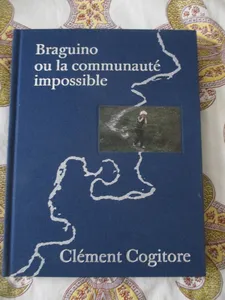 |
| Clément Cogitore's Braguino Ou La Communauté Impossible |
AKT: The story of the bear continues at the moment when the bear head falls forward.
CC: It's like a magical weird moment of shooting. You don't know what's going to happen and you just relax. And you know that it's like gold for filmmakers.
AKT: The other gold is the girl with the paws. She is wearing a princess dress with the bear paws sticking out from underneath.
CC: When you're filming this you know immediately that it's strongly connected and it tells so many things. You have to just take it and create the good rhythm. You just have to be here.
AKT: And the girl's name is Vassilissa, which is a famous name [Alexander Afanasyev's Vasilisa the Beautiful] in Russian fairy tales.
CC: Yes, that and Ivan.
AKT: She has this classic name and she is the bear and the princess simultaneously! No plan, it just happened?
CC: It just happened. I wanted to have a film, you know, like a drawing of a child. You have very simple things: like the monster or the savage, the animal, the childhood, forest, house. This very simple device, little by little turns into more complex or sensitive things.
And also the question of monsters is that until the bear is arriving, you think that he is the monster, he is the real danger of the place and then you realize that it's actually not. It's danger but it's in a way ritualized and they know how to face it. When the helicopter is arriving with these guys, you immediately know that the danger is total. There is no balance, they can't face it. It's too big and they're already lost.
AKT: It's annihilation.
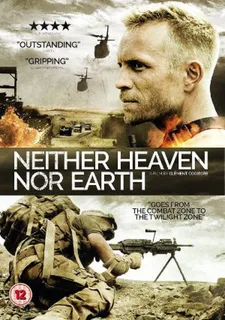 |
| Neither Heaven, Nor Earth poster with deployed helicopters |
CC: The real monster of the taiga is man, actually.
AKT: And it comes with such known force. The world we are entering in the film, the world they created, has other rules than most audiences, I suppose, are familiar with. But when these guys with their guns arrive it is also a recognition of man as we know it.
CC: Definitely, yes. And what is even terrifying for Russian people for example is when you heard the language they speak. Both of them speak Russian, but in Braguino all the days we stayed, we never heard words like "shit" or [other curse words]. The words are really preserved.
And immediately when the helicopter is arriving and the guys are talking to them, it's like a huge pile of garbage was dropped on the place. They are talking a language which is called Mat, which is vulgar Russian and I think it's forbidden to talk it in public places. It's a really rude way of talking. When they are arriving, it's not only the faces and the energy of the guys.
AKT: It's the brutality of the language, too.
CC: And in front of the children! These guys - for Russian people it's specifically really harsh.
AKT: The children playing on the island reminded me of a Swedish children's program that I remember watching in endless reruns on TV, called Holidays on Saltkrokan. It was mostly children playing with each other and having adventures. It's based on an Astrid Lindgren book.
It was just children playing in nature. They were all very blond and very rugged and there was a dog and they were having fun. I loved it because the adults played no role whatsoever. The way the children of the two families interact in Braguino start to develop the way the adults treat each other, but it's not there yet.
CC: I learned a lot by observing children. There is something so beautiful and also sad with these children. When you arrive, Braguino looks like a paradise at first sight. To join Braguino you have to cross Siberia, like the really hard and tough Siberia - the whole cliché of poverty, guns, drugs, ugly and dirty places. It's really the gulag Siberia and the weather is like hell.
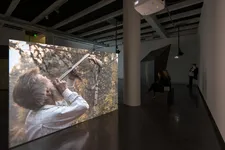 |
| Sacha Braguine with rifle - Braguino Ou La Communauté Impossible at Le Bal in Paris |
The winter is so cold and in the summer you have the mosquitos that kill your skin. It's like a political hell, social hell, and meteorological hell. So when you are crossing all these places and it gets worse and worse, you think "Where am I going to end up?" And in Braguino it's so peaceful and clean.
AKT: Does the name mean anything?
CC: It means to Braguine's place. So when you arrive it's like Switzerland, you can eat off the ground and Sacha knows how to do everything in the forest.
AKT: There is the beautiful quote in the film by Sacha: "You can hunt a little and be fine. Or you can hunt a lot and throw half of it away." I love that.
CC: And all the Braguino project is about that: The good balance between the resources and the forest and sharing the resources. So the utopia, the project, when you arrive you understand what he managed to build is great. In a way it's a masterpiece - managing, having this kind of life here, it looks really like a paradise.
Sacha did not want to raise his children in a village of poverty and violence. He wanted something better for them and he managed to do it. 15 years later arrived the Kilines. Actually, with the Kilines, the two mothers are sisters. It's like you have a biblical conflict, you know?
AKT: Wow, biblical in the sense of Cain and Abel, only with sisters?
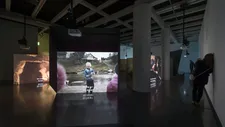 |
| Clément Cogitore on Braguino Ou La Communauté Impossible: "It's a whole installation of videos and photographs." |
CC: Yes. They wanted to share this kind of paradise. The Kilines wanted also to escape from violence, from poverty and to do something different. The Braguines said yes, okay, come with us. And at this very moment things start to switch in a bad way. The ideology of Braguine is balance - you take only what you want from the taiga but also from civilisation.
The Kilines are like the Braguines but the difference is they are more like us in a way that as long as they can take, they take. They are interested in having a bit more than they need and in having money. That does not turn them into criminals, but that moves the balance of the place.
AKT: And allows the hunters to enter.
CC: Because these hunters give them money. So they broke the balance of the place. The winters are harder and harder to survive and with the corruption and these guys it's an open door to the worst of civilisation. This ideological conflict tells the story in the way a bit of a Western, no? An ideological conflict about resources. I understood that at the end of the shooting.
AKT: And the point about the children?
CC: About the children and utopia, what I understood also is, behind these postcards of paradise and the possibility of utopia, there was something really hard and sad for the children. There is no adult who can take care of them all day long and make school and have a project for them. So each day, the adults take them on a little boat and put them on the island in the river.
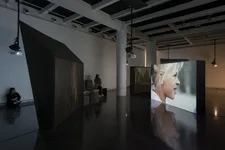 |
| Clément Cogitore: "I was aiming to make a project about autarky, utopia, and children." |
On the children island there are some dogs around and it's the only place where the bears cannot just come and eat the children. The children are all day long on this island, recreation all day long, just playing. But also it's a prison that they can't escape. There is nothing for them constructive for their minds.
AKT: Robinson Crusoe.
CC: In a way, yes, and the utopia turns into captivity.
AKT: It's safe but they cannot escape either. There is also a duality in the scene with the duck that isn't a duck. What are they hunting, it's not pheasants?
CC: I don't know the English name. In French it's Coq de Bruyere.
AKT: A wood grouse. The little girl, when she is pulling out the feathers of the dead grouse she is saying "My little duck! I love you my little duck!" And then they are roasting it - play thing turning into food.
CC: And that was the every-day life of many children one hundred years ago in the countryside.
AKT: Today for most people seeing your film in a cinema in a city this is far far away from their experience. Gender is very noticeable in Braguino. The girls in their dresses seem to have been dressed up for the shoot, whereas the boys are wearing whatever they have. When you speak of free and imprisoned, does that not also mean reinforcing the traditional gender roles in this community? A kind of gender imprisonment in the wilderness?
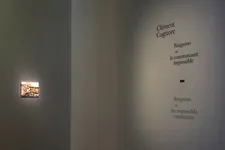 |
| Clément Cogitore: "The exhibition is quite narrative, too. But it is less narrative than the film." |
CC: Gender works in a very archaic way. The men are always outside with the guns and the dogs, hunting, fishing. And the women are always in the houses or in the garden, cooking. The men always like to be alone with the dogs and the women like sitting together. It worked in a very archaic way there.
The César Awards will be announced on Friday, February 22.
Rendez-Vous with French Cinema Opening Night The Trouble with You and Les Indes galantes screenings - Thursday, February 28, 6:30pm and 9:00pm
The uniFrance and Film Society of Lincoln Center's 24th edition of Rendez-Vous with French Cinema in New York runs from February 28 through March 10. Screenings will take place at the Walter Reade Theater, Lincoln Center.





















